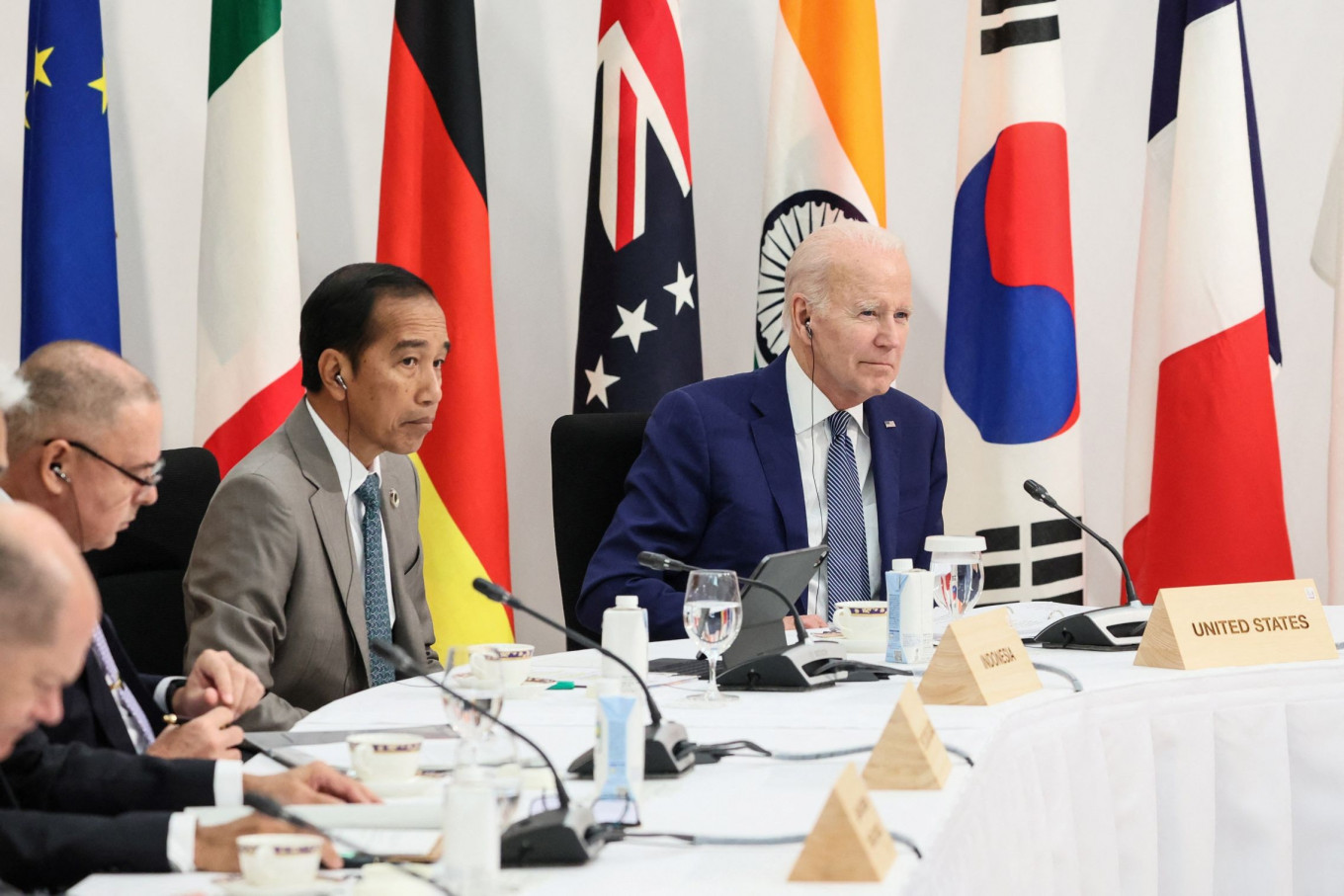Popular Reads
Top Results
Can't find what you're looking for?
View all search resultsPopular Reads
Top Results
Can't find what you're looking for?
View all search results‘Actions, not rhetoric’: Jokowi admonishes G7 for climate financing impasse
President Jokowi fired back at the sluggish progress of financing a just global energy transition, as he called on the leaders of G7 to follow through on their climate pledges.
Change text size
Gift Premium Articles
to Anyone
P
resident Joko “Jokowi” Widodo fired back at the sluggish progress of financing a just global energy transition, as he called on the leaders of the world’s seven most advanced economies to follow through on their climate pledges.
Speaking at a session on climate, energy and environment at the Group of Seven (G7) Outreach Summit in Hiroshima, Japan, at the weekend, Jokowi called on the group of rich countries to put their money where their mouth is.
“Developing countries are becoming doubtful over the funding commitments by developed nations,” the President said in his speech on Saturday.
“The old approach of burden shifting [and] propaganda must be left behind. The world needs real action, not just talking the talk that brings no concrete results,” he said.
Indonesia is not a member of the G7, but was among the few middle-power countries invited to the summit.
Jokowi’s remarks come as Indonesia grows increasingly frustrated with countries that have so far failed to honor their climate financing pledges.
Following the Group of 20 Summit in Bali last year, Indonesia secured a US$20 billion pledge from the G7 over a five-year period, potentially making it the single largest climate-related transaction. It is part of a bigger G7 promise to pledge $100 billion toward climate financing.
Under the deal known as the Just Energy Transition Partnership (JETP), the United States and Japan would preside over a series of grants and loans pooled from public and private lenders to help speed up the country’s transition from fossil fuels to renewable energy sources.
However, as of this year, at the half-way point of the 2030 deadline for the United Nations Sustainable Development Goals (SDGs), Jakarta has yet to see any money trickle in.
In a joint communiqué issued before the summit’s conclusion, G7 leaders said “We are determined to do our part to mobilize the private and public resources needed to meet these [SDG] challenges and support a just transition”.
They also said they would work together with partners to “deliver this ambition […] at key moments over the coming years”, beginning with a climate summit in France in June.
“[We] call for the delivery of existing pledges and for further pledges from all willing and able countries to fulfill the ambition,” the leaders added.
Meeting half-way
Close Jokowi ally Luhut Pandjaitan, who recently returned from Washington, DC, to meet with US climate envoy John Kerry in search of answers, told the press last week that the US was unable to back up its own commitment.
This message was repeated by Indonesia in Hiroshima, when Jokowi called on developed countries to make good on their commitments to realize a greener future.
To make his case, the President reminded that the country had increased its emissions reduction target to 43.2 percent with international support, and listed the accomplishments Jakarta had made in recent years.
“Our deforestation rate has dropped significantly and is the lowest it has been in 20 years. The rehabilitation of 600,000 hectares [ha] of mangroves will conclude in 2024, and we’ve rehabilitated 3 million ha of critical land,” he said.
At a separate bilateral meeting with Canadian Prime Minister Justin Trudeau, Jokowi called for the timely implementation of the JETP pledge, even though the US and Japan are responsible for disbursing it to Indonesia.
“I hope the $20 billion in funding support can be realized immediately, but not in the form of debt,” he stated on the sidelines of the G7 Summit.
In her own press statement to wrap up the President’s activities in Japan, Foreign Minister Retno LP Marsudi said Indonesia’s “concrete commitments must be supported by an empowering partnership”.
Falling flat
Despite mounting concerns over the climate crisis and the clean energy transition, the G7 Summit ended with what environmentalists considered a “lukewarm” commitment from the leaders of the world’s most advanced economies.
Greenpeace International stated on Saturday that the gap between G7 ambition and what climate science demands is “stark and widening”.
In Jakarta, prior to the start of the G7 Summit, climate activists rallied in front of the Japanese Embassy in protest of the JETP program’s lackluster implementation. One environmentalist urged the group of rich nations to drop its “false solutions to energy transition”.
Meanwhile, the world is expected to experience large-scale warming of surface temperatures in equatorial waters between 2023-2027, making it the warmest five-year period ever recorded, according to the World Meteorological Organization report issued last week.










